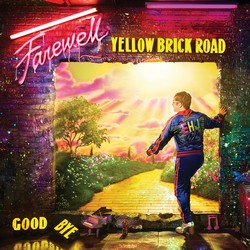Saying goodbye to the things we love is one of the hardest things we do.
We so desperately want to hang onto the things or people that made us happy throughout our lives. We never want to leave those precious moments in the past.
Musicians make songs that can create moments and memories that transpire through generations, making it even more painful to relinquish those who we’ve listened to over the years.
The farewell tour presents the audience an opportunity to see their favorite artists perform their final swan song before hanging it up for good— the problem is; it’s hardly ever the final performance that was advertised.
A frequent trend in the music industry, specifically for older acts that have charmed the world with a bevy of hit tunes, is the idea of having a farewell tour: to give the world one last run of performances before retirement from live shows.
It certainly has an appeal, being a member of an audience that gets to watch a legend do their thing one last time sounds pretty enticing.
However, by taking a step back to look at the history of farewell tours, it tends to be nothing more than a clever advertisement.
In this year alone, musical titans such as Paul Simon, Joan Baez, Ozzy Osbourne, and Elton John have announced, finished, or just started their so-called farewell tours.
While it may seem cynical to question the legitimacy of their retirement claims, it’s not unreasonable to assume there will be future tours.
Kiss recently announced their tour dates for their three-year farewell sendoff, which is both lovely and fantastic, but nearly two decades ago they had a tour that was unfittingly named “Kiss Farewell Tour.”
So if you intend to go rock and roll all night with Gene Simmons and the gang, don’t be surprised to find out that it won’t be the last time you get to bust out your face paint for a live Kiss show.
If these artists aren’t really retiring, but keep launching these massive tour runs, there clearly needs to be some kind of incentive.
Money is obviously at the heart of this dilemma because these shows draw big numbers of fans of all ages.
As if being Elton John wasn’t already enough, a recent Forbes article projects that his final tour will gross roughly $400 million.
That’s a whole lot of cheddar, Elton!
If adding the word farewell to a tour banner will rake in that kind of cash, it’s within the best interest of any artist to go on as many farewell tours as they possibly can.
Not everyone is so pessimistic about the concept of farewell tours. Raymond Romanski, a senior communications student, WMCX DJ, and Outlook Club & Greek Editor, is an avid attendee at farewell shows—a concert connoisseur of sorts.
In 2018 alone, he’s been to Slayer, Machine Head and Ozzy Osbourne’s farewell sendoffs, with plans to see the aforementioned Kiss tour.
“I love farewell tours. I would always shell out money for one. It’s usually the last time you’ll see this musician,” Romanski said.
“Even if I’m not a huge fan of whoever it is, if their tour is labeled as a ‘farewell tour,’ that greatly affects my ticket purchase.”
Romanski doesn’t think it’s all about the money; he appreciates the grind and effort put into these tours by the artists. It’s hard work to be separated from friends and family for so long.
It also presents a chance for one last memorable performance before officially stepping away from performing.
Noah Preschel, a junior communications student and WMCX DJ, finds the idea of music transcending time fascinating and how it resonates with an audience all these years later.
Preschel believes the idea of a farewell tour gives the artists a chance to reconnect with their fans and to get back into the public eye.
“I don’t think the retirement aspect is all that important,” Preschel said. “If an artist hasn’t toured in a long time, I think that’s the overarching reason why people will decide whether to buy tickets or not.”
On the surface, it may seem a bit disingenuous of artists to falsely claim that they will never go on tour again, but does it really matter?
Who’s to tell Paul Simon that he has to promise to retire from playing live concerts? He’s been performing for almost his whole life; it’s not up to the public to decide when he should call it quits.
These types of things have a mass appeal anyway; getting the old band back together is a story that resonates. To some people farewell tours are a nostalgia act, to others they get to see their favorite musician back on stage playing music that makes them feel good; whether or not they are performing for the last time is beside the point.
For a brief moment in time, an audience gets the chance to listen to an artist that they’ve made an emotional connection with.
Besides, when we say goodbye to someone we feel close to, we always hope to see them again soon.
IMAGE TAKEN from up! 99.3



